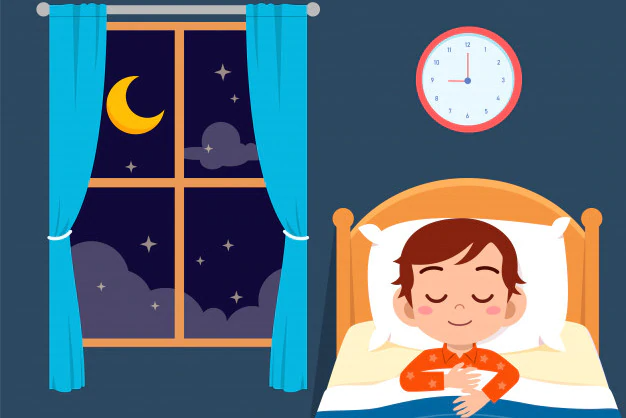We all know one thing for certain… getting kids back on their normal sleep schedule during the school year is a crucial (and super frustrating) aspect for school success. We know that sleep plays an extremely significant role in how we function day in and day out, physically and mentally. It affects how we maintain a solid foundation for good health, how we learn, how we combat stress, etc.
Research has shown that not getting enough sleep can impact the following: 1) a student’s ability to focus and pay attention, 2) a student’s ability to plan and organize, 3) a student’s ability to regulate their mood and behavior, and 4) a student’s capability to remember new material. Therefore, with the school year approaching, it’s imperative that children and teens get back on track in order to do well in school, but more importantly to be flexible and to adapt to any last-minute and disruptive changes during these unprecedented times.
Here are 10 tips to help ease your child and/or teen back into their school sleep schedule as well as some tips to maintain healthy sleep habits throughout the year:

1) Start this process early if you can, and start slowly.
Parents are encouraged to start about 2-3 weeks prior to school starting to help your child/teen adjust to an appropriate sleep schedule. However, if you didn’t get a chance to start early, this is still the first step in getting back on track. Parents should set an incrementally earlier bedtime every night and an incrementally early wake-up time every morning. It is important to make sure that your child/teen will wake up with the amount of sleep they need for their age-group. Guidelines indicated that 3-5 years old need about 10-13 hours of sleep, 6-12 years old need about 9-12 hours a day, and 13-18 years old need about 8 to 10 hours a day.
2) Stick with the regular sleep schedule when feasible.
Once you got this established, stick with it as much as possible. Your child/teen should try to go to sleep and wake up at the same time every day, even on weekends. Do your best to stick to the schedule. Try to not allow your child/teen to catch up on sleep over the weekend. However, if your child/teen likes to sleep in on the weekends, it is recommended that they should wake up within 2 hours of the weekday wake-up time (e.g., if the wake-up time is 6 AM during the week, the weekend wake-up time should be no later than 8 AM). Try to stick to this sleep schedule even when summer rolls around the next year.
3) Establish a bedtime routine.
Encourage your child or teen to have “quiet time” before they go to bed. This allows them to unwind to promote more efficient and healthy sleep. We’ve all been there where we have gone to bed with all the stress built up from the day, making it more difficult to fall asleep. Relaxing activities, for example, can, be a bedtime story, quiet reading time, taking a bath, listening to music, setting their alarm clock, picking out their outfit for the next day, doing stretches or breathing exercises etc.
4) Take away electronics.
Set clear limits of when these need to be turned off. It is recommended that all electronics, TV, video games, cell phones, etc. be shut off an hour before they go to bed. If your child/teen are easily tempted to use this during the night, it should be removed from their room.
5) Promote a relaxing and peaceful sleeping environment.
It’s important to keep the bedroom’s atmosphere in mind. The bedroom should be comfortable, dark, cool, and quiet. It’s okay to have a nightlight in the room.
6) Try to avoid naps during the day
especially as it gets closer to their bedtime. Yes, some naps can be helpful, but generally taking naps late in the day/early evening have the potential to make it difficult to fall asleep at night. Avoiding naps ensures that your child/teen will be tired at bedtime. If they are unable to avoid it completely, the general recommendation is to make sure the nap is less than an hour and before 3 PM.
7) Avoid caffeinated drinks and big meals.
A good rule is to avoid any caffeinated beverages 6 hours before their bedtime. A light snack before bed would be a good idea as your child/teen shouldn’t go to bed hungry, but they shouldn’t eat a big meal before bed.
8) Keep the bed for sleeping.
Try to not have your child/teen use their bed for any other activity besides sleeping. This helps to associate bed with sleep versus other activities like watching TV, reading, doing homework, etc. Suggest having your child/teen read in a nearby chair or bean bag if this is a part of their bedtime routine. It’s important for them to make the connection that the bed is only used for sleeping.
9) Keeping them active at the right time.
Parents are encouraged to keep their child/teen active during the day and late afternoon when they get home from school; however, it’s best to avoid strenuous exercise before bedtime. Avoid overloading your child/teen with too many activities especially before bedtime.
10) Set clear limits and be a good role model.
Let your child/teen know what the rules are and stick to them. Be clear from the beginning about what you expect (e.g., how many bedtime stories can be read, what time does the lights need to be turned off, what time are electronics put away, what are valid reasons for them to get out of bed, what are the consequences, etc.) Help your child/teen out by setting a good example for them to see. Practice having your own regular sleep cycle/schedule. Make it a family plan to get everyone back on track.


